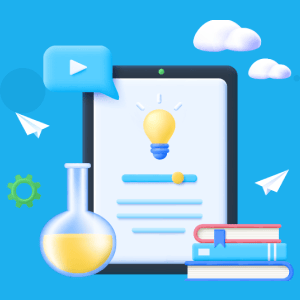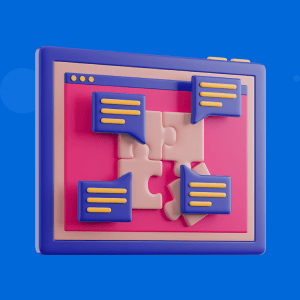Informal learning strategies
Table of Contents
Have you ever learned something new when going about your daily life? Perhaps it was a conversation with a colleague, a video on social media, or a surprising fact in an instruction manual. This is what’s known as informal learning. While it may not have intentional structure, informal learning can be incredibly powerful and effective. So, what are informal learning strategies, exactly?
This guide will:
- Define informal learning
- Highlight the personal and professional benefits of informal learning strategies
- Discuss the types and strategies of informal learning
- Explain how these strategies can be applied and improved within organizations
What is informal learning?
Informal learning is an educational approach that takes place outside of conventional structured settings. Unlike traditional learning settings, it is unstructured and often unplanned. This form of learning is called “asynchronous,” meaning that it takes place independently and at the learners’ own pace. Informal learning happens throughout daily life, such as when you learn a new word from a book or get advice from a friend while playing a game.
Types of informal learning strategies
Informal learning comes in many formats, including watching videos, self-study, reading articles, having conversations, and even playing games. Basically, any learning that occurs outside of a classroom, course, or other formal learning method. Although there are countless types of informal learning, they can all be divided into three categories: self-directed, incidental, and socialization.
Self-directed
Self-directed learning is just as it sounds. It takes place without the help of an instructor but may include a resource person. This type of learning allows individuals to pursue knowledge and skills based on their personal interests or career aspirations. For example, watching a YouTube tutorial to learn how to create a Salesforce report or reading an article explaining how to build a SCRUM process.
Incidental learning
Incidental learning, on the other hand, occurs when the learner does not intend to learn from a specific experience, but learning still takes place. This can happen during daily life activities such as overhearing a conversation or watching a news report. An example could be overhearing a colleague explain a new software system to improve workflow efficiency or reading about a recent industry survey while perusing an online news source.
Socialization
Social learning takes place every day, even without intentionally being sociable or interacting. By observing and imitating others, you learn through socialization. For example, a better understanding of effective leadership skills can be developed by observing the leadership practices of effective managers around you. Or you may adopt the viewpoints of your manager just through regular conversations.
What are informal learning strategies useful for?
Informal learning strategies offer organizations many benefits with the potential to drastically enhance business growth and progress.
More self-awareness
By engaging in informal learning, employees gain more profound insight into their abilities and weaknesses. This also leads to heightened self-assurance, more accurate decision-making, and higher resilience in the face of challenges. For example, say an employee takes up gardening as a hobby. Through gardening, they realize their ability to nurture with patience which cultivates great value over time. In turn, this employee applies this ability to the team that they manage and starts focusing on how to cultivate the team’s skills and development for greater value over time.
Enhanced social connections
Informal learning builds deeper connections with others through shared interests and passions which leads to a sense of belonging, greater empathy, and increased social capital. For instance, mentoring relationships can be used to link two people of different ages, ethnicities, or experience levels who may not normally interact and foster a valuable relationship based on common interests and learning.
Improved knowledge retention
People remember better when they care about the information or the experience. Informal learning allows you to learn in the way you want, not the way someone tells you to, which increases the likelihood of being emotionally engaged with the activity. Informal learning encourages learners to absorb information at their own pace and style leading to improved knowledge retention and application.
Flexibility in training delivery
Formal learning or corporate training can often feel rigid and inflexible, limiting its effectiveness. So, what are informal learning strategies doing differently? These approaches are often more flexible and adaptable to individual learner needs and preferences. For example, a short microlearning video might be ideal for a busy sales representative, but a self-paced online course might be a better fit for a team manager who likes structure and needs to convey the course’s details to their team.
Lower costs
Formal training can be expensive, requiring dedicated trainers, training materials, and facilities. On the other hand, informal learning can often be implemented using existing resources such as digital platforms, collaboration tools, and peer-to-peer learning.
Increased engagement
Informal learning is often more engaging and fun than traditional, lecture-style training sessions. You can keep your learners interested and motivated by using various formats and channels (such as videos, podcasts, social media, and gamification). Informal learning also takes place in the real world which makes the information more relevant and useful.
Better learner feedback
Formal training can often be one-sided with trainers delivering and learners receiving. But informal learning can be more interactive, collaborative, and bi-directional allowing learners to give and receive feedback and for the learning experience to be adapted in real time.
How to apply informal learning strategies
As a leader, it’s important to create an environment that supports and encourages ongoing learning. Here are some strategies to foster a growth-minded culture and informal learning opportunities:
Peer coaching
Set up a chat or forum for team members to share their knowledge and expertise. By promoting knowledge sharing, you enhance your team’s ability to learn from one another and promote a growth mindset.
Choose your own adventure
Providing team members with resources and tools to curate their own learning experience helps them take ownership of their development and improve skills on their own time. Ideas for incorporating self-directed learning could be providing a video library of useful tutorials or offering to pay for courses or certifications that employees enroll in on their own.
Job shadowing
Allowing team members to observe and learn from colleagues who excel in their roles is a great way to help them build skills, gain confidence, and learn new perspectives. This is also great for onboarding new employees as it allows them to learn the ropes while building connections and gaining valuable insights from experts.
Lunch and learn sessions
Organize regular sessions where team members can share their knowledge, skills, and experiences over lunch. This can help build a stronger sense of community within the organization and foster ongoing learning.
Action learning
This involves engaging team members in real-world projects or initiatives that provide hands-on learning experiences, such as learning while executing a client project or adapting a service over time as it is being offered. This approach can help to build practical skills and knowledge that can be immediately applied in the workplace.
Mentoring
In this approach, younger or less experienced co-workers are paired with more seasoned team members. While older employees offer valuable expertise and experiences, the younger employees provide a fresh perspective. Both parties walk away with new skills and insights.
Best practices for informal learning
It’s important to create a safe, supportive learning environment and encourage experimentation and risk-taking. With the right approach and the right tools, you can unlock the power of informal learning and help your team thrive. Here are some best practices to help your informal learning strategy be even more effective:
- Make information digestible: Breaking content into bite-sized pieces, also known as microlearning, allows learners to consume information in smaller, more manageable parts. It has been found to increase engagement and improve retention.
- Keep it intimate: Facilitating small groups and one-on-one interactions allows learners to have personalized interactions with their peers and colleagues, leading to a better learning experience.
- Offer timely feedback: Timely feedback helps learners reflect on their performance and improve their skills in the moment. Give constructive feedback that is detailed and focused on solutions.
- Use real-life scenarios: Use scenarios that simulate relevant real-world situations to achieve learning objectives. As technology advances and the world changes, scenarios may need updating.
- Embrace multimedia: Incorporating a mix of multimedia formats appeals to different learning styles. For example, a mixture of video tutorials, online mentoring discussions, and articles helps the learner evaluate the topic in different ways and keeps the experience interesting.
- Gamify the learning experience: Informal learning activities such as quizzes, challenges, and competitions make learning more fun and engaging. This increases motivation helping to improve the quality of your informal learning strategy.
Use a learning management system
What are informal learning strategies lacking that a learning management system (LMS) can help with? An LMS provides employees with access to content used to teach skills and knowledge outside of traditional training settings. It also enables organizations to track and measure the success of informal learning initiatives, providing data that can drive future efforts.
Docebo is an LMS used by teams of all sizes that want to build and deliver creative informal learning strategies. By leveraging the power of Docebo’s LMS, organizations can optimize the learning experience and achieve better outcomes. To support your growth even further and learn more about effective learning strategies, check out our glossary.








